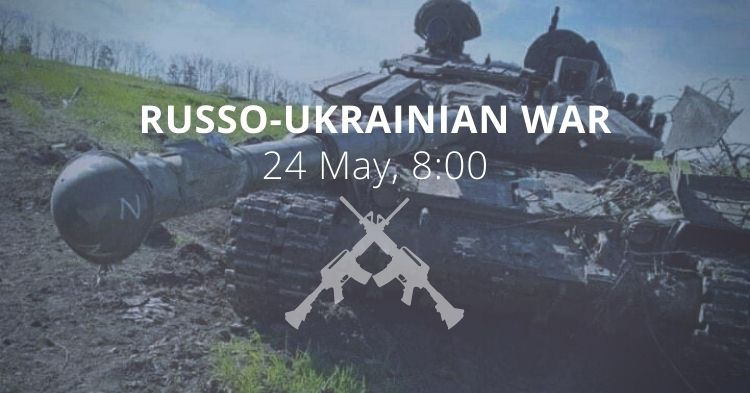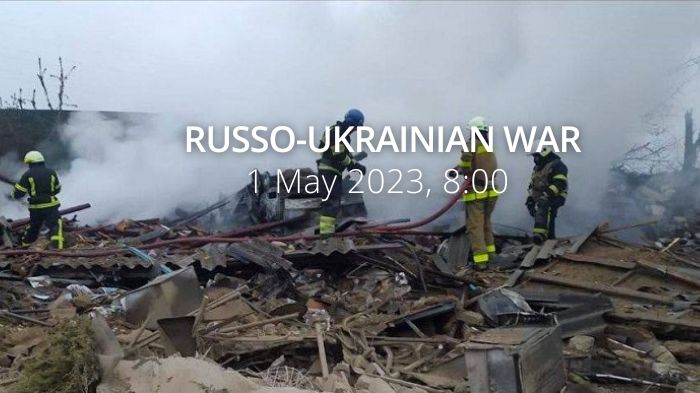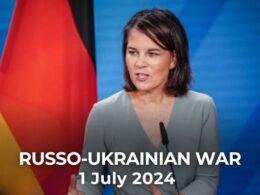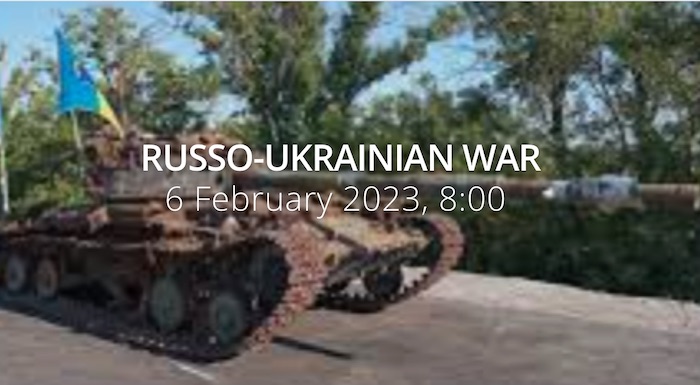Russia captured two towns on the southern axis of its Sievierodonetsk operation seeking to encircle the rest of Luhansk Oblast in the Donbas, while Ukraine reclaimed a key village in the area. Russia intensified air and artillery strikes around Izium preparing a new offensive. President Zelenskyy revealed Ukraine’s worst military loss so far, saying that a recent Russian missile strike on barracks in Chernihiv Oblast killed 87 soldiers. Denmark is going to arm Ukraine with Harpoon anti-ship missiles for the protection of Ukraine’s coasts from the Russian navy.
Situation
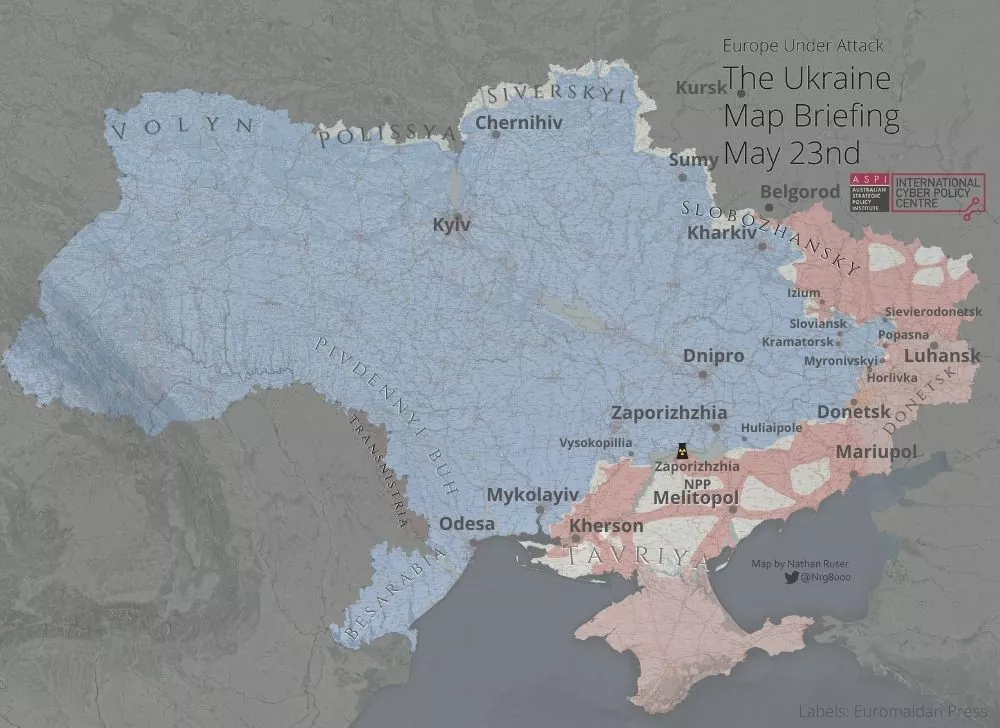
A short overview of developments at the front as of the evening of 23 May 2022 according to military expert Roman Ponomarenko:
Russia has intensified the use of aircraft to destroy infrastructure in the battle zone. Also, after the capture of Mariupol, the Russians released a considerable amount of artillery previously used against the Azovstal plant, the city’s last Ukrainian stronghold. Most likely, the artillery is going to be used on the fronts of Donetsk Oblast, or near Huliaypole, Zaporizhzhia Oblast
Currently, Luhansk Oblast remains the hottest spot of the war. The Russian troops continue attacks on Sievierodonetsk, whose Ukrainian garrison repels the Russian thrusts from several directions. Street fighting goes on in Komyshuvakha north of Popasna. The Russians are also trying to advance on Bakhmut and Soledar.
In Donetsk oblast’s northeast, south of Luhansk’s Popasna, Russians captured Myronivskyi, east of Svitlodarsk.
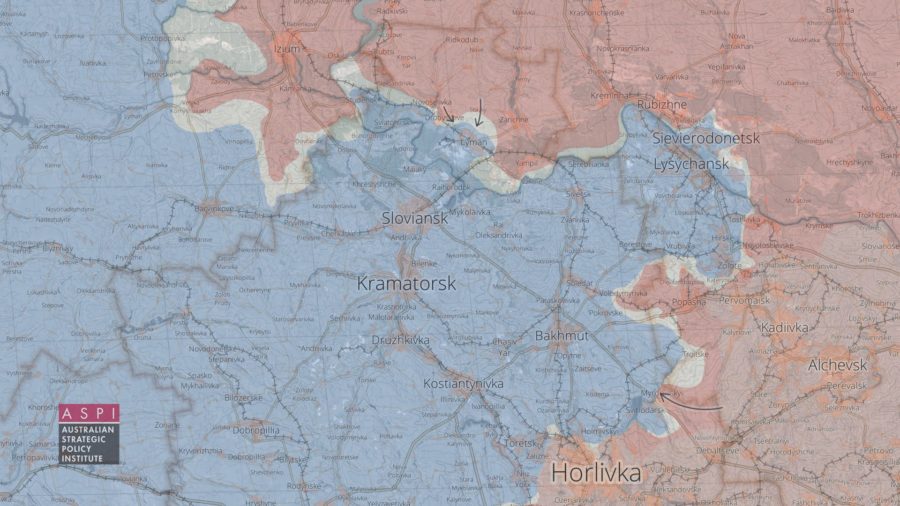
Hostilities were ongoing in the area of Sloviansk in the northwest of Donetsk oblast. Russian troops stormed Lyman, a city surrounded on three sides, breaking into the city from the north, occupying several streets and hitting Lyman’s residential areas with thermobaric rockets and air bombs. Sviatohirsk came under fire, while the fighting took place near Bohorodychne and Studynok in its area.
The front line stabilized in Kharkiv Oblast’s northern border areas. The Ukrainian military hasn’t yet managed to push the Russians back to the Russian territory. The Russian forces carry out active local attacks in places like the area of Ternova, conduct reconnaissance and artillery shelling. Local battles continue at Kharkiv’s Barvinkove and Izium on the previous frontiers as Russians fire on the villages of Husarivka and Chepil.
No changes or significant events were reported from Zaporizhzhia, Mykolaiv and Kherson oblasts.
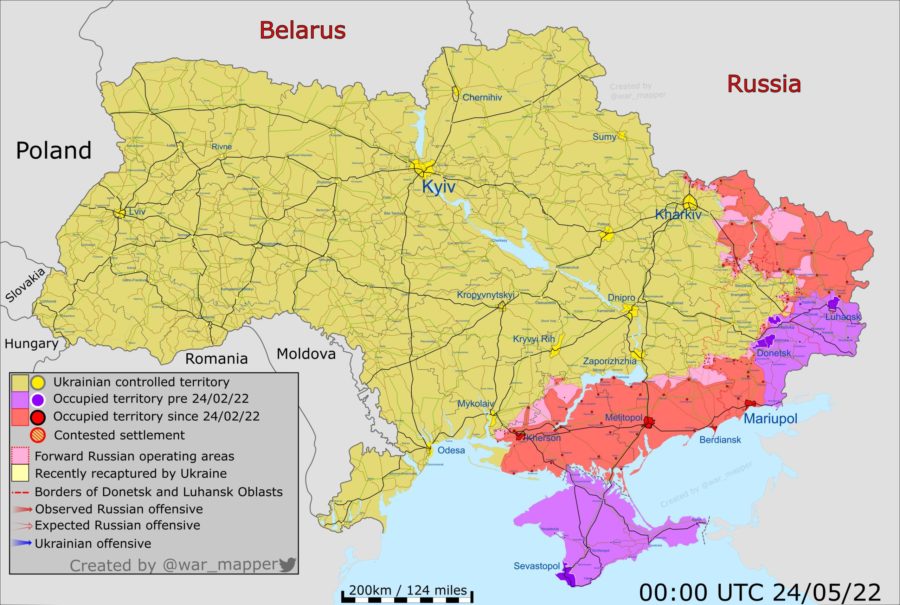
Ponomarenko’s May 24 early update mentions that the Ukrainian forces left the town of Svitlodarsk north of occupied Horlivka, Donetsk Oblast. He calls it a tactical retreat to a more convenient defense position with the destruction of a bridge across the Luhan river and retaining control of the Luhanske and Vuhlehirsk thermal-electric power plants.
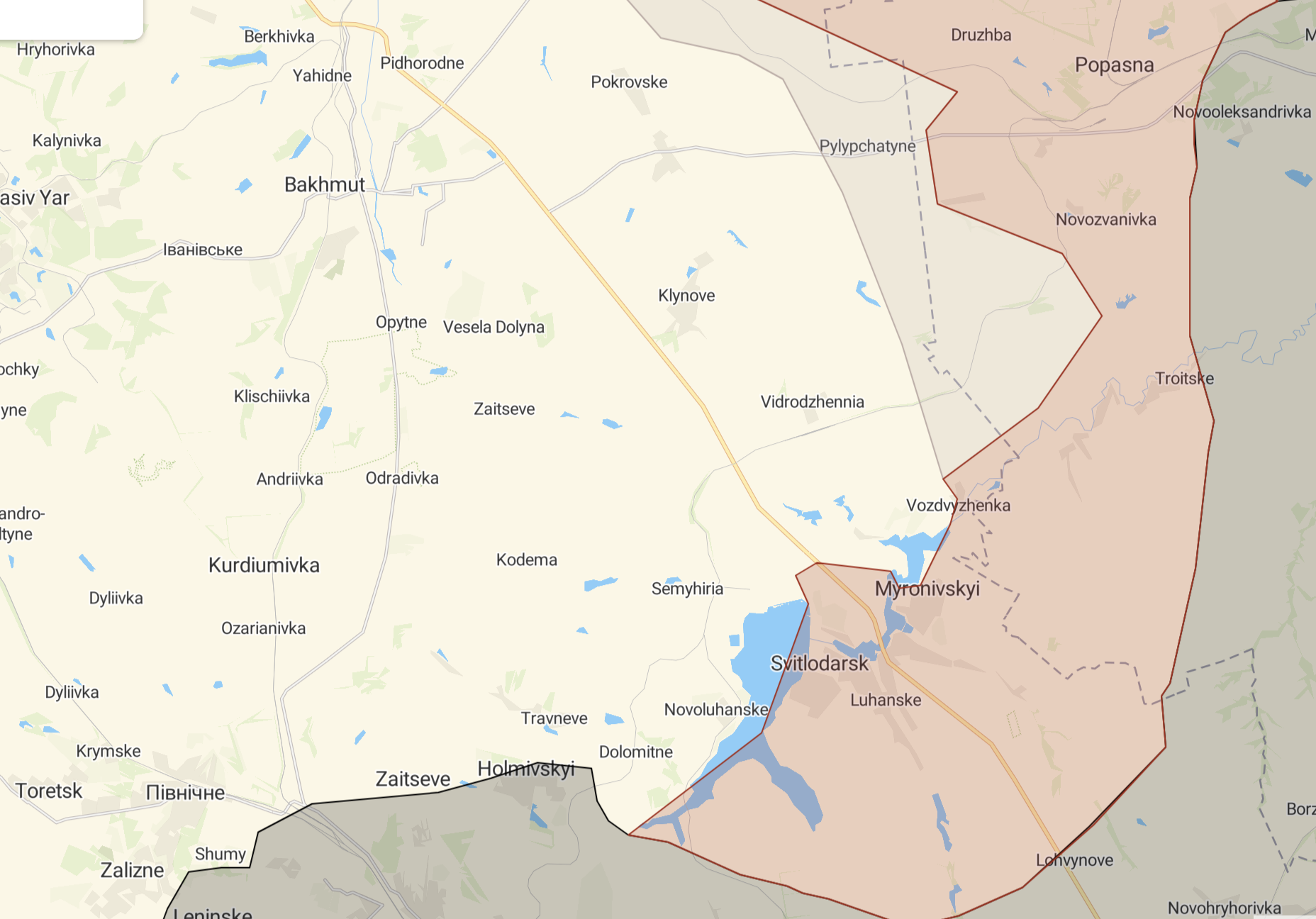
Morning report day 90 – May 24
The report is based on media reports, expert analyses and official information posted online.
Information from the General Staff as of 06.00 24.05.2022, supplemented by its [18:00 assessment] is in the drop-down box below.
In the Volyn and Polissia directions, certain units of the Armed Forces of the Republic of Belarus continue to carry out tasks to cover the section of the Belarusian-Ukrainian border in the Brest and Gomel regions.
- The threat of missiles and airstrikes on the objects of Ukraine from the territory of the Republic of Belarus is growing. The aggressor moved the division of 9K720 Iskander-M (SS-26 Stone) to the Brest region at a distance of up to 50 kilometres from the state border of Ukraine.
In the Siverskyi direction, Russian forces continue to take measures to strengthen the cover of the Ukrainian-Russian border in the Bryansk and Kursk regions and to prevent the transfer of our troops to other directions. Engineering equipment of positions in the areas of the international automobile checkpoint “Pogar” and the settlement of Sluchovsk in Bryansk Oblast is noted.
- Russian forces launched an airstrike on the positions of our troops in the area of the settlement of Bilopillia, Sumy oblast.
In the Slobozhanskyi direction, the Russian forces group focuses its efforts on maintaining its positions and improving its tactical position. In particular, the enemy is carrying out assault operations to consolidate the western and northern outskirts of the village of Ternova.
- [With the support of artillery, the enemy resumed assault in the area of the settlement of Ternova but had no success.]
- In the Sloviansk direction, Russian forces units are preparing to resume the offensive. The aggressor, to support the offensive, deployed additional units of artillery in the southern part of the city of Izium. [Yesterday, it launched an airstrike near the settlement of Bohorodychne and fired artillery at the settlements of Husarivka, Chepil, Dolyna and Sviatohirsk. Russian forces used rocket-propelled grenade launchers and heavy flamethrower systems in the area of the Studenok settlement.]
In the Donetsk direction, Russian forces are focused on conducting an offensive operation to encircle the cities of Lysychansk and Sievierodonetsk, with subsequent access to the administrative border of the Luhansk region.
- In the Lyman direction, Russian forces’ crossing of the Siverskyi Donets River on the Dronivka-Belogorovka section is not ruled out. To cover the crossing, Russian invaders deployed MLRS and artillery. [No active hostilities were reported in the Lyman direction yesterday. Russian forces carried out artillery shelling of units of the Defense Forces and civilian objects in the village of Lyman.]
- [Yesterday, In the direction of Luhansk, it conducted reconnaissance by battle, had no success and withdrew.]
- In the Sievierodonetsk direction, Russian forces, with the support of artillery, carried out assault operations in the directions of Toshkivka and Ustynivka. [Yesterday, with the support of artillery, the enemy conducted assault operations, had no success, suffered losses and retreated.]
- [Yesterday, In the Bakhmut direction Russian forces tried to launch an offensive but were unsuccessful. Tonight,] Russian forces improved their tactical position in the area of Vasylivka.
- In the Avdiivka, Kurakhove, and Novopavlivka directions, the enemy fired at our units with the use of artillery and aircraft.
- In the Zaporizhzhia direction, Russian occupiers are strengthening groups of troops to resume offensive operations in the direction of Vasylivka – Kamianske. Carry out regrouping.
- Over the past 24hrs, sixteen enemy attacks have been repulsed in the Donetsk and Luhansk directions, eight tanks, twenty-two units of armored combat vehicles and one enemy vehicle have been destroyed.
In the Pivdennyi Buh direction, Russian forces continue to focus their efforts on maintaining the occupied frontiers. [Russian occupiers continue to shell the positions of our troops to restrain their actions. Engineering equipment of defensive lines in the area of the settlement Posad-Pokrovsky proceeds.]
- In the Kryvyi Rih and Mykolayiv directions, Russian forces do not stop artillery shelling our troops’ positions.
- [Measures of the administrative-police regime in the temporarily occupied territories of Ukraine continue. Thus, according to available information, Russian occupiers created nineteen so-called “commandant’s offices” in the temporarily occupied territories of Kherson and Zaporizhzhia oblasts.]
- [According to available information, to increase the air defense system, Russian forces are deploying two additional S-400 anti-aircraft missile divisions in the north-western part of the temporarily occupied Autonomous Republic of Crimea.]
The situation in the Black Sea and Azov operational zones has not changed significantly. [Russian naval groups continue to carry out tasks to isolate combat areas and missile strikes on infrastructure facilities in Ukraine.]
Russian forces continue to use terror tactics against the Ukrainian civilian population in the occupied territories and the socio-economic situation in the south and east of Ukraine continues to deteriorate.
Aviation units of the Air Force and Air Defence of the Land Forces destroyed six UAVs, a cruise missile and thirty armored combat vehicles.
[The moral and psychological condition of the occupiers remains low, there is a systematic use of alcohol and desertion. The personnel of Russian forces’ units complain about the ineffectiveness of their attacks on the positions of the Defense Forces of Ukraine.]”
Ukraine Army hits Russian command post with NATO-standard howitzer, the Ukrinform reports. The 128th Separate Mountain Assault Zakarpattia Brigade have hit a Russian command post with a NATO-standard howitzer, the 128th Separate Mountain Assault Zakarpattia Brigade wrote on Facebook. The target was located more than 20 kilometres away and, thus, the accurate shot demonstrates the high precision of weapons, which the Armed Forces of Ukraine have already received and will receive in the future.
Belarus continues military exercises at the border, the Ukrainska Pravda reports. The Belarusian Armed Forces have continued and will continue training on borders with Ukraine and Western countries until at least 28 May, according to Belaruski Haiun.
- “The Belarusian Armed Forces have intensified their reconnaissance activities and are deploying additional units of troops near the Ukrainian-Belarusian border.
- British intelligence says Lukashenko is trying to avoid direct involvement in the war in Ukraine.
- At the same time, Belarus has sent “special operations forces” to the border with Ukraine, because the General Staff of Belarus wants to respond to the “threat” from the Armed Forces of Ukraine along the border.
- Thus, Ukrainian defenders are forced to keep a large contingent on the border with Belarus, instead of strengthening their positions in the east of the country. Additionally, Russian activity has intensified in Moldovan Transnistria.»
Russia may set up a military base in Ukraine’s Kherson region – RIA, the Reuters reports.
“The Russia-appointed administration of Ukraine’s Kherson region will ask Moscow to set up a military base on its territory, Russia’s RIA news agency quoted a [so-called] local government official as saying on Tuesday. Russia invaded Ukraine in February, seizing, in particular, the Kherson region which is adjacent to Crimea, the peninsula that Moscow has controlled since an earlier conflict in 2014. It has installed a new administration there and started introducing the Russian rouble as a currency. “There should be a Russian military base in the Kherson region,” Kirill Stremousov, the deputy head of what Russia calls the “civil-military regional administration” of Kherson, told RIA”.
According to British Defence Intelligence, (last 24 hours):
- Russia has increased the intensity of its operations in the Donbas as it seeks to encircle Sievierodonetsk, Lysychansk and Rubizhne. At present, the northern and southern axes of this operation are separated by approximately 25 km of Ukrainian-held territory.
- There has been strong Ukrainian resistance with forces occupying well dug-in defensive positions. Ukraine’s long-established Joint Force Operation likely retains effective command and control of this front. Russia has, however, achieved some localised successes, due in part to concentrating artillery units.
- Russia’s capture of the Sievierodonetsk pocket would see the whole of Luhansk Oblast placed under Russian occupation. While currently Russia’s main effort, this operation is only one part of Russia’s campaign to seize the Donbas. If the Donbas front line moves further west, this will extend Russian lines of communication and likely see its forces face further logistic resupply difficulties.
As of Tuesday 24 May, the approximate losses of weapons and military equipment of the Russian Armed Forces from the beginning of the war to the present day:
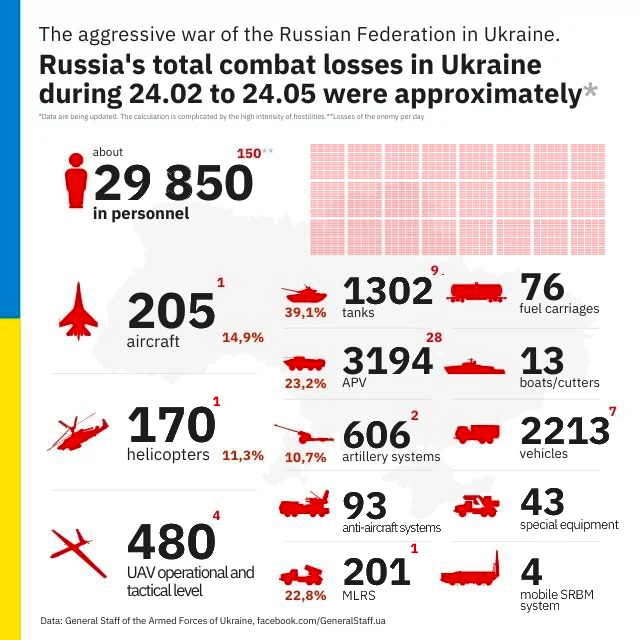
Russian enemy suffered the greatest losses (of the last day) in the Sievierodonetsk direction.
Humanitarian
According to UNHCR 6,552,971 refugees have been registered as of May 22. The UN says that so far:
- Poland has taken in 3,505,890 refugees,
- Romania 961,270,
- Russian Federation 919,934,
- Hungary 644,474,
- Republic of Moldova 471,223,
- Slovakia 442,316
- Belarus 27,308.
Among those who fled Ukraine are also Ukrainian nationals with dual citizenship. An additional 105,000 people moved to the Russian Federation from Donetsk and Luhansk oblasts between 18 and 23 February.
The number of Ukrainians entering Ukraine since February 28 is 2,048,500 as of May 22. This figure reflects cross-border movements, which can be pendular and does not necessarily indicate sustainable returns.
OHCHR recorded 8,462 civilian casualties in Ukraine as of May 22. 3,930 were killed (including 257 children) and 4,532 injured (including 394 children).
Environmental
Ukraine calls for help to secure safe passage for food exports, BBC reports, the Reuters reports. The international community should help secure safe passage for food export vessels in a corridor out of the port city of Odesa to help Ukraine and avoid world hunger, the BBC quoted Ukrainian First Deputy Prime Minister Yulia Svyrydenko as saying on Monday.
“It would take us 5, 6, 7 years to export all these agricultural yields by [rail/road]. So right now it’s extremely important for us to unblock the seaports,” the BBC quoted her as saying in an interview at the World Economic Forum.”
Legal
Captured Russian serviceman received a life sentence for murdering a civilian, the Ukrainska Pravda reports. The Russian serviceman Vadim Shishimarin, accused of killing a civilian in the Sumy region, was condemned to life imprisonment.
Russian soldier sentenced for life in Ukraine’s first Russian war crimes case
Ombudsperson reports terrifying incidents of child rape by Russian soldiers, the Ukrinform reports.
“Verkhovna Rada Commissioner for Human Rights Liudmyla Denisova spoke of the latest reported cases of Russian soldiers raping children in Oleksandrivka, Kherson region. The youngest victim was just 6 months old. Some of the assaulted children died of the inflicted injuries. This is stated by the Ukrainian ombudsperson on Telegram. Russia uses rape and sexual violence in other forms as warfare tactics — systematically, everywhere and with shocking brutality,” the statement reads. […] Denisova stressed that sexual violence is strictly prohibited by Article 27 of the Geneva Convention relative to the Protection of Civilian Persons in Time of War of 1949. Rape is a war crime and one of the components of genocide”.
Russian forces fired cluster munitions at the Kryvyi Rih district, the Ukrainska Pravda reports. According to the Office of the Prosecutor General on Telegram, “on 23 May, the occupiers once again fired artillery with prohibited cluster munitions in the village Mala Kostromka, Kryvyi Rih district, Dnipropetrovsk Oblast. In addition, on 22 May, Russian forces shelled the outskirts of the village of Zelenodolsk, Kryvyi Rih district. Fragments of unexploded ordnance with prohibited cluster munitions were found at the scene. The Dnipropetrovsk Regional Prosecutor’s Office is investigating violations of the laws and customs of war”.
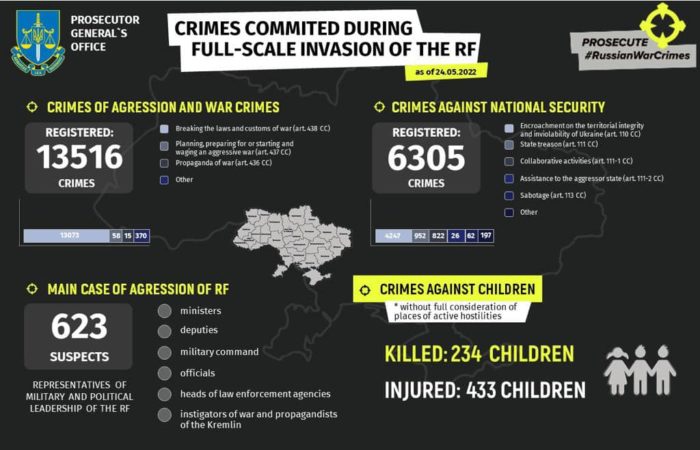 234 children were killed and 433 children injured, the Office of the Prosecutor General of Ukraine reports as of May 24. 1,848 educational establishments are damaged as a result of shelling and bombings, 173 of them are destroyed fully. 13,516 crimes of aggression and war crimes and 6,305 crimes against national security were registered.
234 children were killed and 433 children injured, the Office of the Prosecutor General of Ukraine reports as of May 24. 1,848 educational establishments are damaged as a result of shelling and bombings, 173 of them are destroyed fully. 13,516 crimes of aggression and war crimes and 6,305 crimes against national security were registered.
Support
Defence ministers from more than 40 countries took part in Rammstein-2, an online meeting on Ukraine, the Cencor.net reports. “The virtual meeting was joined by the Minister of Defense of Ukraine Oleksiy Reznikov, Deputy Commander-in-Chief of the Armed Forces of Ukraine and a representative of the Defence Intelligence of Ukraine. The meeting was also joined by four new countries that were not present at Ramstein last month: Austria, Bosnia and Herzegovina, Colombia, Ireland and Kosovo. “Since the Russian invasion on February 24, more than 40 of our allies and partners around the world have stepped up to provide important security assistance to help Ukraine defend itself, and today we are honored to have defense leaders from 44 countries and NATO and NATO The EU, “Austin said.”
- Ukraine to get Harpoon anti-ship missiles from Denmark amid Russian Black Sea blockade, the Defence News reports. “Denmark will arm Ukraine with a modern Harpoon anti-ship launcher and missiles to protect its coasts, Defense Secretary Lloyd Austin said Monday after concluding the latest US-led meeting of international defense chiefs to coordinate military aid for Ukraine.”
- Italy, Greece, Norway and Poland would be donating artillery systems and ammunition, Austin announced.
- Overall, 20 countries announced new security assistance packages, according to Ukraine Business News. “Denmark has agreed to provide Ukraine with a Harpoon launcher and missiles to help Ukraine defend its coast. The Czech Republic decided to send attack helicopters, tanks and rocket systems. Other nations came forward with new commitments to train Ukraine’s forces and sustain its military systems. Secretary Austin will host the third meeting of the contact group in person in Brussels on June 15, Austin said after the second virtual meeting of the contact group Monday”.
The Czech Republic is among five major military aid donors to Ukraine, the Ukrinform reports. “The Czech Republic is one of the five largest military aid donors to Ukraine. The government has allocated more than $100 million in assistance to Ukraine and more than $50 million has been transferred to the embassy’s charity account in almost three months. “The first [element of assistance] is what the Czech government donates to Ukraine, such assistance already exceeds 100 million dollars, I would even say it’s about 130 million dollars. The second is that Ukraine buys directly from Czech producers. And the third is what our embassy implements jointly with the Ministry of Defense,” Ambassador Extraordinary and Plenipotentiary of Ukraine to the Czech Republic Yevhen Perebyinis said in an interview with RFE/RL”.
The UK backs Lithuania’s plan to lift the Russian blockade of Ukraine grain, The Guardian reports. “Britain has backed in principle a proposal by Lithuania for a naval coalition “of the willing” to lift the Russian Black Sea blockade on Ukrainian grain exports. Landsbergis proposed that a naval escort operation – not run by NATO – could protect the grain ships as they headed through the Black Sea and past Russian warships. He suggested that, apart from Britain, countries that were affected by the potential loss of grain such as Egypt could provide the necessary protection.
“His plan, under gestation for weeks, would require demining parts of the Black Sea to ensure safe passage, as well as the agreement of Türkiye, which guards the entrance to the Black Sea. This would be a non-military humanitarian mission and is not comparable with a no-fly zone, he said. In this endeavour military ships or planes or both would be used to ensure that the grain supplies can leave Odesa safely and reach the Bosphorus without Russian interference. We would need a coalition of the willing – countries with significant naval power to protect the shipping lanes and countries that are affected by this”.
Belarusians join the war seeking to free Ukraine and themselves, the Defence News reports. “Belarusians are among those who have answered a call by Ukrainian President Volodymyr Zelenskyy for foreign fighters to go to Ukraine and join the International Legion for the Territorial Defense of Ukraine. And volunteers have answered that call, given the high stakes in a conflict which many people see as a civilizational battle pitting dictatorship against freedom. Weakening Putin, the Belarusian volunteers believe, would also weaken Lukashenko.”
EU assistance to Ukraine since the war-start reaches EUR 4.5B, the Ukrinform reports. Since the start of a full-scale Russian invasion of Ukraine, the European Union has provided a total of EUR 4.5 billion in financial support to Ukraine. This was announced by Deputy Head of the Office of the President, Ihor Zhovkva at a briefing on Monday.
New developments
- There was an attempt on the life of President Putin, the Ukrainska Pravda reports. “Kyrylo Budanov, the Head of the Chief Intelligence Directorate of the Ministry of Defence of Ukraine says that there was an attempt on the life of Russian President Vladimir Putin after the start of the war against Ukraine. “There was an attempt to assassinate Putin… He was even attacked, it is said, by representatives of the Caucasus, not so long ago. This is non-public information. [It was an] Absolutely unsuccessful attempt, but it really happened… It was about 2 months ago.”
- Zelensky: Next few weeks of the war will be difficult, the Ukrinform reports. He stated this in a nightly video address. “The Russian occupiers are trying very hard to show that they allegedly will not give up the occupied areas of the Kharkiv region, the Kherson region, the occupied territory of the Zaporizhzhia region and Donbas. They are going on the offensive in some areas. Reserves are being accumulated in some areas. Somewhere they are trying to reinforce their positions. The coming weeks of the war will be difficult. And we must be aware of that,” Zelenskyy said. At the same time, he stressed that Ukrainians have no alternative but to fight, “fight and win, free our land and our people because the occupiers want to take away from us not just something, but everything we have, including the right to life for Ukrainians.”
- Zelenskyy says that only the issue of ending war can be discussed at a meeting with Putin, the Ukrinform reports. “No decisions are made without him [Putin]. And we must be clearly aware of this… And if we are talking about a specific decision to end the war, then this decision will not be made without him, we won’t do without a meeting with the Russian president. And after what they have done, you know, we have no great desire for these meetings and there can and should be no great desire to meet with mediators. Therefore, in principle, I do not accept any meeting with anyone from the Russian Federation, except the president of the Russian Federation. And only if there is one issue on the table – the one on ending the war. That’s it. There is nothing else to talk about,” Zelenskyy said. The head of state said this during an online conversation at the Ukrainian House in Davos”.
- Latvia’s PM: Only solution to war is the victory of Ukraine and defeat of Russia, the Ukrinform reports. “Prime Minister of Latvia Krišjānis Kariņš is convinced that the only solution to the full-scale war, which has been going on since February 24, is the victory of Ukraine and the defeat of Russia. Kariņš explained that any other option could potentially give Russia time and opportunity to restore and rearm itself to expand its imaginary empire, Delfi reports.
The Prime Minister of Latvia made such a statement to comment on the opinion of some Western politicians that the war could be ended by sacrificing part of the territory of Ukraine, which would allow Russian president Putin to save face” Kariņš urges these politicians to ask themselves whether they are ready to sacrifice the people and the territory of their own country. This approach is absurd, he stressed.”
- German economy minister expects EU embargo on Russian oil ‘within days’ -ZDF, the Reuters reports. “The European Union will likely agree on an embargo on Russian oil imports within days, Germany’s economy minister said on Monday, but making a dent in Russia’s war chest may require capping global oil prices. He warned, however, that an embargo would not automatically weaken the Kremlin. Rising global oil prices after the United States announced an embargo on Russian oil enabled it to rake in more income while selling lower volumes. Therefore, the European Commission and the United States were working on a proposal to no longer pay “any price” for oil, but to cap global prices, he said”.
- Moscow is not sure it needs resumed ties with the West and will work on ties with China -Lavrov, the Reuters reports. “Russia’s foreign minister said on Monday that Moscow would consider offers from the West to re-establish ties and determine whether that is needed, but will focus on developing relations with China. Sergei Lavrov […] said Western countries had espoused “russophobia” since Russia launched its incursion into Ukraine – described by Moscow as a “special military operation”. Russia was working to replace goods imported from Western countries, he said and in future, would rely only on “reliable” countries not beholden to the West. “If they (the West) want to offer something in terms of resuming relations, then we will seriously consider whether we will need it or not,” Lavrov said, according to a transcript on the foreign ministry’s website.”
Assessment
On the War
The Institute for the Study of War has made the following assessment as of Monday 23 May:
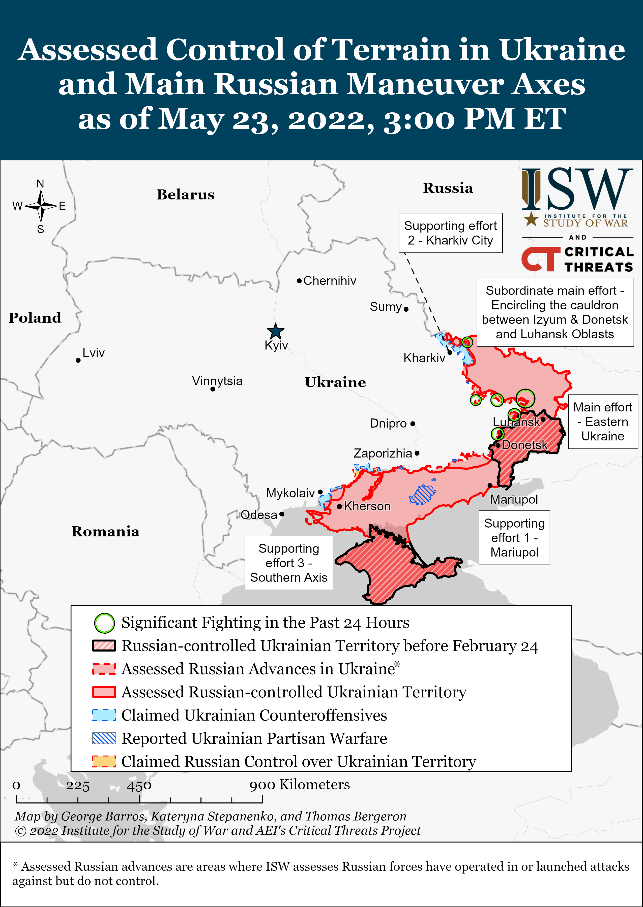 The Assembly’s letter may be a leading indicator of elements of the Russian government and society setting informational conditions to declare partial mobilization. However, the Kremlin has so far declined to take this step likely due to concerns over domestic backlash and flaws in Russia’s mobilization systems. The All-Russian Officers Assembly called on Putin to recognize the independence of the DNR and LNR three weeks prior to the Russian invasion of Ukraine, setting conditions for the Russian “special military operation.” Russian Defense Minister Sergey Shoigu announced on May 20 that Russia will form 12 new Western Military District units (of unspecified echelon) before the end of the year in response to NATO expansion. Russian forces may intend to man these units with newly mobilized personnel, as it is unclear how else the Kremlin could generate the manpower for new units. The Ukrainian General Staff also reported that Russian forces are withdrawing old T-62 tanks from storage to form new BTGs. Russia is likely continuing to exhaust its remaining combat-ready reserves to maintain the momentum of the Battle of Sievierodonetsk, rather than prioritizing preparations for new reinforcements. ISW previously assessed that Russian mobilization is unlikely to generate combat-ready force due to hasty training.
The Assembly’s letter may be a leading indicator of elements of the Russian government and society setting informational conditions to declare partial mobilization. However, the Kremlin has so far declined to take this step likely due to concerns over domestic backlash and flaws in Russia’s mobilization systems. The All-Russian Officers Assembly called on Putin to recognize the independence of the DNR and LNR three weeks prior to the Russian invasion of Ukraine, setting conditions for the Russian “special military operation.” Russian Defense Minister Sergey Shoigu announced on May 20 that Russia will form 12 new Western Military District units (of unspecified echelon) before the end of the year in response to NATO expansion. Russian forces may intend to man these units with newly mobilized personnel, as it is unclear how else the Kremlin could generate the manpower for new units. The Ukrainian General Staff also reported that Russian forces are withdrawing old T-62 tanks from storage to form new BTGs. Russia is likely continuing to exhaust its remaining combat-ready reserves to maintain the momentum of the Battle of Sievierodonetsk, rather than prioritizing preparations for new reinforcements. ISW previously assessed that Russian mobilization is unlikely to generate combat-ready force due to hasty training.
More Russians supportive of the Kremlin and the Russian invasion of Ukraine are beginning to criticize the Kremlin openly. Russian milbloggers claimed that the Kremlin will not honour the Officers Assembly appeal, indicating an intensifying negative perception of the Russian leadership among Russians supportive of the war in Ukraine. Kaliningrad Oblast Governor Anton Alikhanov publicly stated that the Russian war in Ukraine has disrupted transport routes and construction schedules in the region, a rare admission of the economic cost of the war from a Russian government official. The Ukrainian General Staff also reported that Russian military personnel are increasingly complaining about the ineffectiveness of offensive operations against Ukrainian troops.
Unidentified assailants continued attacks against military recruitment offices in Russia on May 23, indicating growing discontent with conscription. A Russian Telegram channel reported that an unknown attacker threw a Molotov cocktail at the military recruitment office in the Udmurtia region, which follows a May 19 incident wherein a Russian conscript shot at a recruitment office in Zheleznogorsk-Ilimsky (Irkutsk Oblast) with a pneumatic device. The Ukrainian General Staff previously reported that 12 total attacks on recruitment offices have happened since the beginning of the war, with five happening in the past few weeks alone. These attacks may represent growing domestic discontent with conscription and recruitment practices.
The UK Ministry of Defense reported that Russia has suffered a similar death toll within the first three months of the invasion of Ukraine as was experienced by the Soviet Union over the course of nine years in Afghanistan. The British Ministry of Defense stated that a combination of poor low-level tactics, poor air defense, lack of operational flexibility and poor command methods have resulted in repeated mistakes and failures, which are continuing to be evident in Donbas. The report noted that the Russian public is sensitive to high casualty numbers and assessed that as casualties suffered in Ukraine grow and become harder to conceal, public dissatisfaction will increase.
Key Takeaways
- Russian nationalist figures (including veterans and military commentators) are increasingly criticizing the failures of Russia’s “special military operation” in Ukraine and are calling for further mobilization that the Kremlin likely remains unwilling and unable to pursue in the short term.
- Russian forces around Izium increased their tempo of air and artillery strikes and likely intend to attempt to resume stalled offensive operations in the coming days.
- Russian operations to encircle Sievierodonetsk made minor gains in the past 24 hours, driving north through Zolote. Fighting is ongoing in Lyman (north of Sievierodonetsk) as Russian forces attempt to cut off Ukrainian supply lines
- Russian forces will likely make further minor gains west of Popasna in the near future but are unlikely to be able to quickly seize Bakhmut.
- The Ukrainian counteroffensive northeast of Kharkiv continues to threaten Russian positions and is forcing Russia to pull units from ongoing offensive operations in eastern Ukraine to shore up their defensive positions near Vovchansk.“
Consequences and what to do?
Corridor for food exports out of Odesa would need Russian consent, Western official says, the Reuters reports. Any corridor designed to secure safe passage for food exports out of the Ukrainian port city of Odesa could only occur with Russian consent, a Western official said on Monday, adding it would not be possible without Moscow’s permission. Ukrainian First Deputy Prime Minister Yulia Svyrydenko has called for such a corridor, saying it would help Ukraine and help avoid world hunger.
“Clearly the Russians are dominating that area. It would require the permission of the Russians, some sort of agreement to allow that to take place,” the Western official said, speaking on condition of anonymity. “It would require some sort of security guarantee, I think from Türkiye, to make it a reality. I think the thing that we’d have to rule out is any sense that this could be done without Russia’s permission.”
Hans Petter Midttun’s assessment
NATO does not need Russia’s permission to operate in the Black Sea and protect shipping. This is a part of the global Freedom of Navigation. NATO is not at war with Russia. If NATO was to establish a maritime presence in the area and started escorting ships and Russia decided to – for whatever reason –attack the maritime forces, this would trigger the conflict it is desperately trying to avoid. The assessment by the “Western official” is purely diplomatic consideration based on the idea that the proximity of forces increases the risk of incidents at sea and, consequently, the risk of escalation. That is, however, a political and not a military consideration. NATO’s absence might very well be seen as a sign of weakness and appeasement. It will allow Russia to hold the world hostage to its aggressions.]
Russian forces are no longer only “de-Nazifying” Ukraine but are fighting a war for Russia’s historic territories and existence in the world order, the All-Russian Officers Assembly states. The officers demanded that the Kremlin mobilize all regions bordering NATO countries (including Ukraine), form territorial defense squads, extend standard military service terms from one year to two and form new supreme wartime administrations over Russia, the Donetsk and Luhansk People’s Republics (DNR and LNR) and newly occupied Ukrainian settlements. The officers also demanded the death penalty for deserters.
The letter is not only addressed to President Putin but also the Patriarch of Moscow and All Russia, Chairman of the Government of the Russian Federation, Chairman of the Federation Council, Chairman of the State Duma, Chairman of the Investigative Committee of the Russian Federation and Director of the Federal Security Service.
Shortly before the full-scale invasion on 24 February, several Russian intellectuals and two retired generals expressed strong vocal criticism of President Putin’s attempts to describe NATO as a threat and warned of the catastrophic consequences of war. “Russia does not need a war with Ukraine and the West. Nobody threatens us, nobody attacks us. A policy based on promoting the idea of such a war is immoral, irresponsible and criminal and cannot be carried out on behalf of the peoples of Russia.”
One of the generals was Colonel-General Leonid Ivashov, the Chairman of the All-Russian Officers Assembly, the same organisation that on 19 May demanded stronger measures to fight for Russia’s historic territories and the existence of the world order. Colonel-General Leonid Ivashov either asked or was forced to step down from the position as chairman of the organisation the very same day the last letter was sent.
It is, therefore, important to remember what the All-Russian Officers Assembly originally said 4 months ago (28 January).
And what threatens the existence of Russia itself today and are there such threats? It can be argued that there is indeed a threat – the country is on the verge of completing its history. All vital areas, including demography, are steadily degrading and the rate of population extinction is breaking world records. And degradation is systemic in nature and in any complex system, the destruction of one of the elements can lead to the collapse of the entire system.
And this, in our opinion, is the main threat to the Russian Federation. But this is a threat of an internal nature, emanating from the model of the state, the quality of power and the state of society. And the reasons for its formation are internal: the un-viability of the state model, the complete incapacity and lack of professionalism of the system of power and administration and the passivity and disorganization of society. In this state, any country does not live long.
As for external threats, they are certainly present. But, according to our expert assessment, they are not currently critical, directly threatening the existence of Russian statehood and its vital interests. On the whole, strategic stability is maintained, nuclear weapons are under reliable control, NATO forces are not building up and they are not showing threatening activity.
Therefore, the situation that is being whipped up around Ukraine is, first of all, artificial. […]
The use of military force against Ukraine, firstly, will call into question the existence of Russia itself as a state; secondly, it will forever make Russians and Ukrainians mortal enemies. Thirdly, there will be thousands (tens of thousands) of dead young, healthy guys on one side and the other, which will certainly affect the future demographic situation in our dying countries. […]
In addition, Russia will definitely be included in the category of countries that threaten peace and international security, will be subject to the heaviest sanctions, will turn into a pariah of the world community and will probably be deprived of the status of an independent state.
The president and the government, the Ministry of Defense cannot fail to understand such consequences, they are not so stupid.
The question arises: what are the true goals of provoking tension on the brink of war and the possible unleashing of large-scale hostilities? […]
In our opinion, the country’s leadership, realizing that it is not capable of leading the country out of the systemic crisis and that this can lead to an uprising of the people and a change of power in the country, with the support of the oligarchy, corrupt officials, lured media and security forces, decided to activate the political line for the final destruction Russian statehood and the extermination of the country’s indigenous population.
And war is the means that will solve this problem to retain its anti-national power for a while and preserve the wealth stolen from the people. We cannot suggest any other explanation.
From the President of the Russian Federation, we are officers of Russia, we demand to abandon the criminal policy of provoking a war in which the Russian Federation will find itself alone against the combined forces of the West, to create conditions for the implementation of Art. 3 of the Constitution of the Russian Federation and resign.
We appeal to all retired and retired military personnel and citizens of Russia with a recommendation to be vigilant, organized, support the demands of the Council of the All-Russian Officers’ Assembly, actively oppose propaganda and unleashing a war and prevent an internal civil conflict with the use of military force.
The difference between the two letters is striking. While most of Colonel-General Leonid Ivashov’s predictions have come true, the All-Russian Officers Assembly has aligned itself in support of the Russian illegitimate and unprovoked war in Ukraine. The anti-war rallies we witnessed across Russia in the initial phase of the invasion have disappeared. The voices of the opposition have been silenced. Despite the international condemnation and isolation, the unprecedented number of far-reaching sanctions, the long-term economic consequences of policy changes in the West, Ukrainian resilience and fierce resistance and the constant inflow of Western defense aid to Ukraine, Russia is digging in to secure its strategic aim and objective through military force. There is no sign of a faltering resolve.
Russia is likely to find its strength and resolve in the knowledge that the West remain true to its nature: the increasingly more frequent calls for a peaceful resolution of the war, suggestions of off-ramp alternatives for President Putin, the naïve proposals of the need to compromises at the cost of Ukrainian sovereignty and independence and, not least, our “collective denial” of the true nature of the conflict (as reflected in Russian words and deeds), the idea that a “total pig-headed unwillingness to look facts in the face will see us through” and the consequential unwillingness to resolve the war militarily.
Three months after the full-scale invasion started – and as the global consequences of the war are increasing exponentially – it is time for NATO to demonstrate both will and ability.




